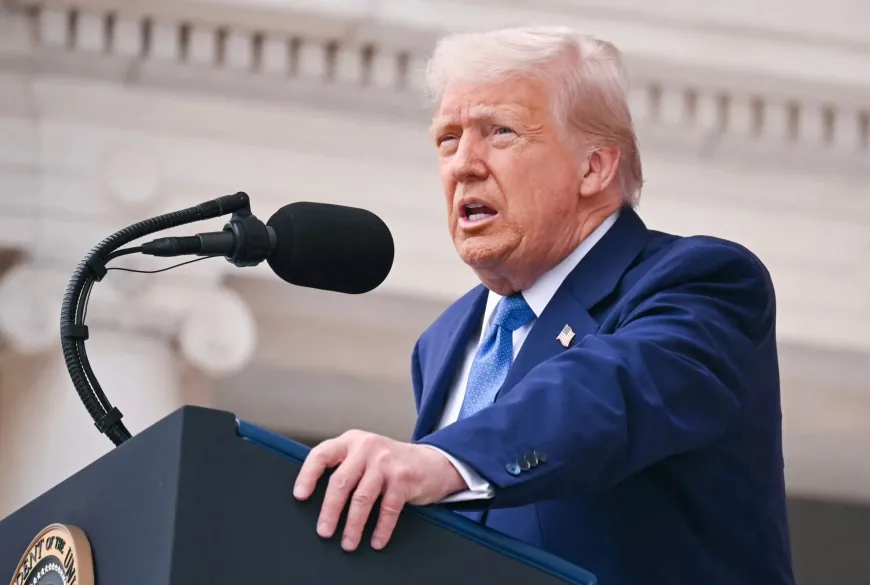Supreme Court to Decide if Trump Overstepped with Tariffs and Presidential Power
Trump's tariffs are under fire in court. A Supreme Court decision could kill them—and limit how much power any president has over trade.

President Donald Trump’s global tariffs—once hailed by him as a strong stance on national security and fair trade—are now facing serious legal pressure. A growing court fight could eventually reach the U.S. Supreme Court, where a powerful legal doctrine might decide whether the tariffs stay or go.
At issue is whether Trump had the legal authority to impose broad import duties under emergency powers, or if he exceeded what the law allows. Legal experts and courts are zeroing in on something called the “major questions doctrine.” This principle, increasingly used by the Supreme Court in recent years, says that federal actions with significant economic or political impact must be clearly authorized by Congress.
This doctrine has already blocked big Biden-era policies—like the Environmental Protection Agency’s climate rules and the student loan forgiveness plan—on the grounds that they were too major to be carried out without specific approval from lawmakers.
Now, the same legal reasoning could be turned on Trump.
Court Battles in Progress
The legal journey began when small businesses affected by Trump’s tariffs challenged them in court, arguing that the former president had overstepped. Last week, the U.S. Court of International Trade ruled against many of the tariffs but didn’t directly apply the major questions doctrine. A few days later, the U.S. Court of Appeals for the Federal Circuit allowed the tariffs to temporarily remain in place while the case continues.
The businesses are urging the courts to lift that stay, arguing that Trump’s use of emergency powers under the International Emergency Economic Powers Act (IEEPA) was unconstitutional. Their main point: Congress never gave the president unlimited authority to set tariffs simply by declaring a national emergency.
Trump's Justification
Trump used IEEPA—a law from 1977 originally meant to limit presidential power—as the foundation for his trade actions. He claimed that illegal immigration and drug trafficking posed an “unusual and extraordinary threat” to the U.S., allowing him to act under emergency powers.
He imposed tariffs on imports from countries like China, Canada, and Mexico under this justification, with a notable announcement on April 2—dubbed “Liberation Day”—when he introduced sweeping “reciprocal” tariffs aimed at multiple trading partners.
Critics say this was a stretch of what IEEPA was designed for. The law was intended to regulate foreign threats in a crisis—not to serve as a blanket trade weapon. It was passed to replace an older World War I-era law that gave presidents sweeping powers during wartime.
What Legal Experts Are Saying
Aaron Tang, a constitutional law professor at the University of California, Davis, believes this case is a prime example of why the major questions doctrine exists. “IEEPA has never been used to impose tariffs like this before,” he explained. “If the courts want to apply the doctrine fairly, regardless of who’s president, this case fits the criteria.”
Tang emphasized that Trump's tariffs likely have greater economic impact than any of the Biden administration policies the Supreme Court has already struck down. “If Biden’s actions required clear congressional backing, so do Trump’s,” he said.
Still, the Trump team argues that the major questions doctrine doesn’t apply here. They say the president—not just federal agencies—has broad discretion in matters of national security. In their view, Trump’s use of IEEPA was legal and necessary to protect the country.
Can a President Rewrite Trade Rules Alone? This Case Could Decide
This case isn't just about tariffs — it's about whether a president can bypass Congress by using emergency powers to reshape trade policy. Trump’s legal team argues that IEEPA gives the president broad authority in the name of national security. But his challengers insist that such sweeping power to impose tariffs—without direct congressional approval—violates the Constitution.
The major questions doctrine, which has already been used by the Supreme Court to strike down bold policy moves under President Biden, could now be applied to Trump. And if it is, it could spell the end for his so-called “Liberation Day” tariffs, and more broadly, limit the ability of any future president to unilaterally impose economically significant trade measures.
A decision by the Supreme Court applying this doctrine to Trump’s tariffs would be historic—it would be the first time the justices rule that even presidential actions, not just federal agencies, must meet a higher legal threshold when they carry massive political or economic weight.
Currently, the Federal Circuit’s temporary stay keeps Trump’s tariffs in place, but the legal battle is far from over. If courts rule that Trump’s broad use of IEEPA to justify sweeping tariffs exceeds his authority, it would set a strict limit on presidential emergency powers in trade. This decision could firmly establish that only Congress—not the president—can approve large-scale tariff policies with major economic impact, reshaping how future presidents handle trade emergencies.
Also Read: Tariffs, Tension & Tesla: The Real Reason Elon Musk Left the White House Just After 10 Days
































































